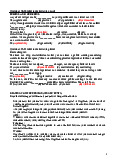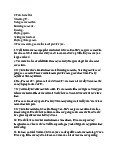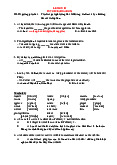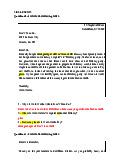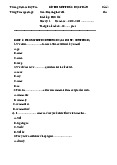





Preview text:
LESSON 11 Letters and E-mails
I. Question types and reading strategy
Questions related to letters or e-mails are often about the purpose of a letter or an e-mail, (an
attachment(s) or a request to the recipient.
Questions about the purpose of a letter or an e-mail
Typical questions: What is the purpose of the letter?
Why was the e-mail written?
Reading strategy: The purpose of a letter or an e-mail is usually stated at the beginning of a
reading passage, particularly after such expressions as I am writing to...,
This e-mail is to... The topic can also be found in the heading Subject: ... or Re: …
Questions about (an) attachment(s)
Typical questions: What is enclosed with this letter?
What did Mr. Wright send with his e-mail?
Reading strategy: Information about (an) attachment(s) in a letter or an e-mail is usually
mentioned at the end of a reading passage. Look around the words
enclose, send with, attach to find hints for the answer.
Questions about a request
Typical questions: What does Mr. Ryan ask Ms. Jane to do?
What are employees asked to do?
Reading strategy: Requests are usually presented near the end of letters or e-mails.
Questions about a request are often information questions. Identify the
key word(s) in the question and search for hints for the answer near the
end of a reading passage, particularly, the request is often implied in the
sentence containing I would appreciate your ~ing or I would be very grateful if you could...
II. Common expressions used in letters or e-mails
Expressions showing the topic of e-mails: Subject:, Re:
Expressions showing the purpose of letters or e-mails: I am writing to, I want you to know, This e-mail is to
Expressions showing attachments: enclose, send with, attach
Expressions showing requests: I would appreciate your ~ing, I would be grateful if you could, Please
The questions below refer to the following letter.
Questions: 1. What is the purpose of this letter? Purpose (A) To ask for an exchange (B) To inform a wrong delivery
2. What is enclosed with this letter? Key word (A) An invoice (B) The faulty product
3. What does Mr. Jefferson request ? Key word (A) Free delivery (B) A warrant Analyzing: 1.
From the word purpose, you can easily see that the question is
about the purpose of the letter. The purpose is often stated at the beginning of a letter.
According to the first sentence in the letter, I am writing to inform you that the products
I ordered from your company on September 10 were wrongly delivered, choice (B) To
inform a wrong delivery is the correct answer. 2.
From the key word enclosed, you can understand that the
question is about an attachment. The key word enclosed can be found near the end of the
letter; then hints for the correct answer can be found there. Based on the sentence
Enclosed with this letter are the invoice and the catalogue, choice (A) An invoice is the correct answer. 3.
The key word request indicates that the question asks about the
request mentioned in the letter. The key word request is paraphrased as I would be
grateful if you could send me at the end of the letter where hints for the correct answer
can be found. Choice (B) A warranty is the correct answer.
III. Paraphrasing practice
Practice paraphrasing the following sentences by
choosing the correct option.
(Paraphrase: Diễn giải)
1. We assure you that your order will arrive within seven days.
= Delivery is ________ to take place within a specific time. A. likely B. guaranteed 2. I
a copy of your flight itinerary with my letter send .
= ________ please find the information on your travel plans. A. Enclosed B. Revised
3. I have attached the technical specifications for the AC20 to this e-mail.
= A list of the product's ________ is included with the e-mail. A. costs B. details
4. Thank you for finding the data that I had asked you about.
= I appreciate your taking the time to ________ the requested information. A. locate B. fill out Vocabulary assure [ə'∫uə, ə'∫ :] ɔ enclose [in'klouz] cost [k st ɔ ] order ['ɔ:də] revise [ri'vaiz] detail ['di:teil] take place attach [ə'tæt∫] appreciate [ə'pri:∫ieit] specific [spə'sifik] technical ['teknikl] locate [lou'keit] guarantee [,gærən'ti:]
specification [,spesifi'kei∫n] fill out itinerary [i'tinərəri] include [in'klu:d]
5. Schedule your appointment a week before you want to have your car checked.
Appointments for car maintenance should be made a week in advance.
You should check your car service appointment one week ahead of time.
6. Please give me information about the conference facilities at your hotel.
A I would like some details about the meeting rooms at your hotel.
B I want to have a meeting about the services available at your hotel.
7. Improperly disposing of motor oil can contaminate drinking water. A
Motor oil must be disposed of in specific areas. B
Disposing motor oil inappropriately can pollute drinking water.
8. Mr. Sigh is in charge of organizing the reception for the overseas investors.
A Mr. Sigh takes responsibility for planning a welcome party.
B Mr. Sigh is the receptionist for the overseas branch. Vocabulary schedule ['∫edju:l] improperly [im'prɔpəli] pollute [pə'lu:t] appointment [ə'p intmənt ɔ ] dispose [dis'pouz] be in charge of maintenance ['meintinəns] contaminate [kən'tæmineit] overseas [,ouvə'si:z] in advance inappropriately investor [in'vestə] ahead of take responsibility for + facility [fə'siliti] [,inə'proupriitli] V-ing
Question 9 refers to the following letter. Dear Ms, Jackson,
Our law firm has recently decided to move to a more spacious office due
to an increase in the number of employees in the last year. Additional
furniture, office supplies, and equipment are needed for our new
location. As we were very satisfied with the quality of goods and
services you have provided in the past, we look forward to working with
you to furnish our new office. I would appreciate your giving us a cost
estimate for the items mentioned in the enclosed document
9. What is enclosed in the letter? A. A product catalog B. A list C. A quote
Questions 10 refers to the following e-mail.
FROM: Christopher Knight, Personnel Manager
10. What must one do if one receives a confidential file accidentally? TO: All staff A Contact the technician B Send it to the supervisor
This e-mail is to notify staff that all data contained in the personnel information
files is confidential. It should only be shown to authorized executives. C Inform Mr. Knight
Reviewing or sharing any information you find with a third party, is strictly
forbidden and could result in termination of employment. If you are given Vocabulary
access to a file by mistake, please report it to me immediately. additional [ə'di∫ənl] quote [kwout] forbidden [fə'bidn] location [lou'kei∫n] personnel [pə:sə'nel]
termination [,tə:mi'nei∫(ə)n] be satisfied with confidential [,k nfi'den∫l ɔ ] employment [im'pl imənt ɔ ] quality ['kw liti ɔ ] authorized ['ɔ:θəraiz] access ['ækses] furnish ['fə:ni∫] executive [ig'zekjutiv] by mistake estimate ['estimit] third party accidentally [æksi'dentəli]
Questions 11-12 refer to the following letter.
11. What is the purpose of this letter?
To find out why phone bill has been much higher than usual
12. What does Ms. Hay request the company do?
Reimburse for the incorrect charges and send a statement that reflects the changes
